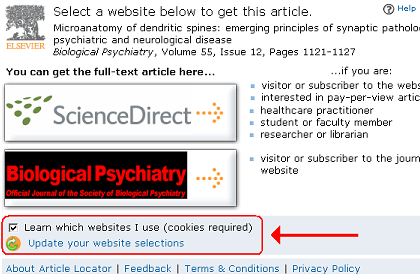Two weeks ago, we noticed a nasty problem with the AutoAlert emails created by OvidSP for the database "Current Contents". Last Friday we posted following announcement on the MPG entry page for the Ovid Database Server:
Dear users of the Ovid AutoAlert feature,
Due to technical problems on Ovid’s side you may be experiencing that you cannot login to the OvidSP server when following a link provided by your AutoAlert email. This problem can be solved manually by changing the host address of the link provided, i.e. by switching from
http://ovidsp.ovid.com/ovidweb.cgi?T=JS&MODE=ovid&PAGE=titles&NEWS=n&D=ccall&AUTOALERT=[…]
to
http://ovid.gwdg.de/ovid-bin/login.cgi?T=JS&MODE=ovid&PAGE=titles&NEWS=n&D=ccall&AUTOALERT=[…]
Please feel free to contact Alexander Struck (Ovid) or Inga Overkamp (MPDL) if you are facing difficulties. We would like to apologize for any inconvenience.
This Friday, we are happy to announce that Ovid’s support staff managed to restore the appropriate proxy setting, thus any upcoming email should contain links which can be resolved successfully by users in the Max Planck Society.
Case closed? Not really, because this particular problem was just one indicator of circumstances specific to the Max Planck Society: Neither MPG IP ranges nor personal user accounts are registered on the online OvidSP server itself. Instead, the MPG maintains a local login page which checks the credentials provided by a user (IP address or personal login) and redirects the request to OvidSP if the authentication succeeded. Keeping the login procedure local reduces the administrative effort immensely, but as drawback users from the MPG are not able to login via the "official" OvidSP homepage. This is fine in most cases because all MPG sites point to http://ovid.gwdg.de, but some scientists may try to access the resource via another path and fail. Let’s state the obvious: the current setup is not ideal.
Solution? For now the situation will remain as it is, but we are looking forward to the results of the MPG-AAI project which tries to establish an MPG-wide authentication and authorization infrastructure. A practicable solution for the MPG? I don’t know, but it has the potential to solve the Ovid login problem…

 and “blank”).
and “blank”).
